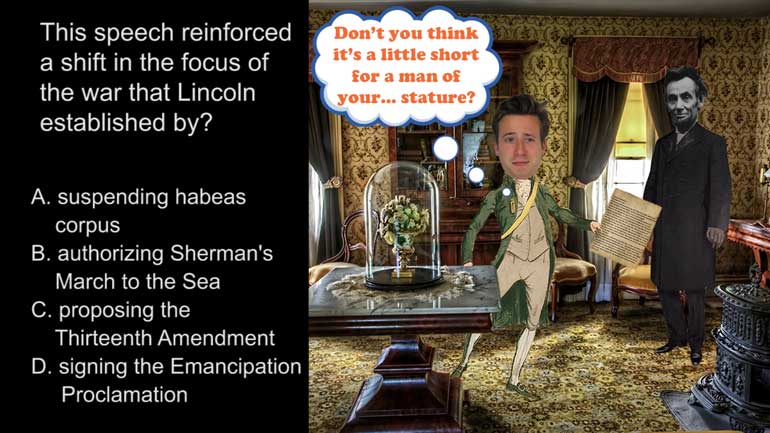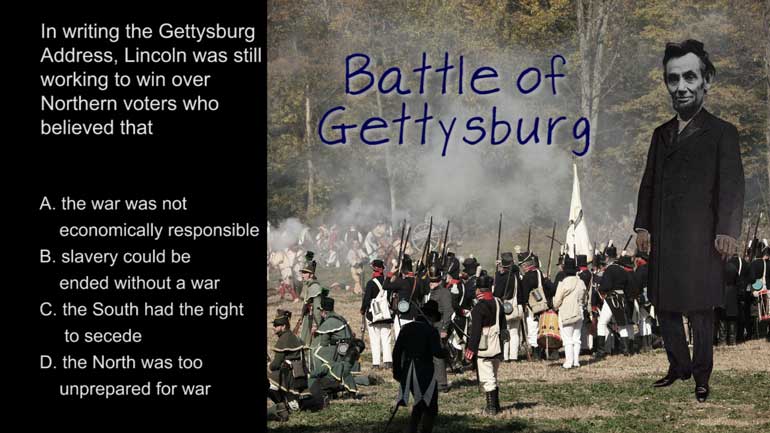ShmoopTube
Where Monty Python meets your 10th grade teacher.
Search Thousands of Shmoop Videos
AP U.S. History 2.4 Period 5: 1848-1877 229 Views
Share It!
Description:
AP U.S. History 2.4 Period 5: 1848-1877. In general, how did Northerners respond to the Black Codes?
Transcript
- 00:00
[ musical flourish ]
- 00:03
And here's your Shmoop du jour, brought to you by undermining,
- 00:06
searching for gold in the lowest of places.
- 00:10
Well, first up - the excerpt.
- 00:11
[ mumbling ]
Full Transcript
- 00:13
[ mumbling continues ]
- 00:16
All right, Thirteenth Amendment. The big one-three.
- 00:18
And now the question.
- 00:20
Which of the following trends most
- 00:22
severely undermines the intentions of the Thirteenth Amendment?
- 00:26
And here are your potential answers.
- 00:28
[ mumbles ]
- 00:30
[ mumbling ]
- 00:33
All right, well what exactly is this question asking?
- 00:36
Well, in the excerpt, it says that
- 00:38
the Thirteenth Amendment abolished slavery
- 00:40
and involuntary servitude in the U.S.
- 00:43
So we need to find the answer
- 00:45
that managed to jeopardize that
- 00:47
monumental leap forward in human rights.
- 00:50
So could the trend undermining
- 00:51
the Thirteenth Amendment have been B -
- 00:53
the disappearance of large-scale
- 00:56
plantations in the South?
- 00:58
Hmm. Well, even though slavery was abolished
- 01:00
the South remained a plantation-based
- 01:02
economy with a large emphasis on agricultural goods
- 01:06
to export abroad.
- 01:07
So that knocks out B and D right there.
- 01:09
What about C - the industrialization of the economy?
- 01:13
Well, actually, the emergence of large factories
- 01:15
created a bunch of jobs for former slaves,
- 01:17
so that would have been a giant help
- 01:19
for the Thirteenth Amendment.
- 01:21
So it's not C, either.
- 01:22
That means the trend undermining
- 01:24
the Thirteenth Amendment was A -
- 01:26
the continuation of the sharecropping system.
- 01:29
Even though formal slavery was officially illegal,
- 01:32
plantation owners found a giant loophole
- 01:34
to exploit freed slaves -
- 01:36
sharecropping.
- 01:38
Under this system, former slaves rented land,
- 01:41
seeds, and supplies
- 01:43
from the plantation owners
- 01:45
in exchange for part of their
- 01:47
crop - like sharing it
- 01:49
- which provided only a smidge more independence
- 01:51
than slavery itself, because the former
- 01:53
slaves were the ones working the land.
- 01:55
That means the answer is A.
- 01:57
Light on the share, heavy on the cropping.
Up Next
AP U.S. History Exam 2.45. The journey shown on the map was an example of...what?
Related Videos
AP U.S. History Exam 2.26. This speech reinforced a shift in the focus of the war that Lincoln established by...what?
What did the Spanish messengers bring with them to North America? Hint: you probably wouldn't be thrilled to get this for your next birthday.
AP U.S. History Diagnostic 24. How did the United States choose containment over the National Security Council Report in Latin America?
AP U.S. History Exam 2.25. In writing the Gettysburg Address, Lincoln was still working to win over Northern voters who believed that...what?




